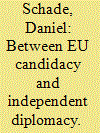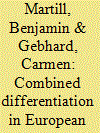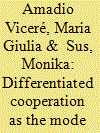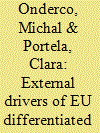| Srl | Item |
| 1 |
ID:
190070


|
|
|
|
|
| Summary/Abstract |
This article considers differentiated cooperation between European Union (EU) member states and third countries in diplomatic statements at the Organization for Security and Cooperation in Europe (OSCE). Using a novel dataset on interventions in OSCE Permanent Council meetings, it analyzes when and why third countries align with the EU's positions. The observed alignment patterns underline the complexity of third country motivations to form part of the EU's diplomatic alliances, such as their institutional proximity to the organization, or their own involvement in regional conflicts. In so doing the article explores the limits of differentiated diplomatic cooperation with the EU in multilateral security organizations. It also points to the constraints the EU faces when trying to establish itself as a relevant player in European and international security through diplomatic acceptance and amplification of its own views by others.
|
|
|
|
|
|
|
|
|
|
|
|
|
|
|
|
| 2 |
ID:
190067


|
|
|
|
|
| Summary/Abstract |
Sustaining meaningful defense cooperation in Europe is made difficult by defense-industrial fragmentation, a multiplicity of institutional frameworks, divergent strategic cultures and domestic opposition to integration. The European Union’s recent foray into defense integration incorporates multiple forms of differentiation to overcome these barriers, with Permanent Structured Cooperation (PESCO) characterized by selective membership, external participation, and project-based clustering. Such “combined differentiation” offers an instructive example of how EU practices and principles can contribute to meaningful defense collaboration, even though Brussels is often thought a weak actor externally. It also illustrates how distinct forms of differentiation can be embodied within a single structure to accommodate complexity in strategic preferences. Using the example of PESCO, this article shows how “combined differentiation” has emerged as a response to the nature of the European defense landscape and how debates between member states about how to respond to specific challenges have brought about further differentiation over time.
|
|
|
|
|
|
|
|
|
|
|
|
|
|
|
|
| 3 |
ID:
190064


|
|
|
|
|
| Summary/Abstract |
While the standard conceptualization of differentiation in the European Union (EU) focuses on differentiated integration, scholars devote less attention to differentiated cooperation. This article argues, on the contrary, that member states’ engagement in differentiated efforts in EU foreign policy manifest themselves both in the form of differentiated integration and cooperation. It elaborates an original conceptual framework for exploring differentiated cooperation as a mode of governance. Drawing on the articles in this special issue, this introduction maps empirical manifestations of differentiated cooperation in various areas and dimensions of EU foreign policy. The results of the special issue show that differentiated cooperation has mostly manifested itself in informal patterns of cooperation, with the treaty-based mechanisms being limited. As such, the special issue reflects the differentiation and informalization processes occurring not only in the EU, but also in global governance more broadly.
|
|
|
|
|
|
|
|
|
|
|
|
|
|
|
|
| 4 |
ID:
190069


|
|
|
|
|
| Summary/Abstract |
Since its establishment, the Common Foreign and Security Policy (CFSP) has strived to increase convergence among EU member states. Yet, convergence remains elusive and scholars have started to explain the emergence of differentiated cooperation resulting from multiple internal EU crises. We posit that the convergence in the EU member states with respect to nuclear weapons has been fundamentally altered by the humanitarian turn to nuclear disarmament. This has led to a crystallization of differentiated subgroups among the member states, whose membership coincides with that of informal groupings active in the broader nuclear nonproliferation regime. Combining quantitative data on resolution sponsorship at the Non-Proliferation Treaty review process and voting at the UN General Assembly, we show that significant change in the international nuclear nonproliferation regime led to differentiated cooperation within the CFSP, resulting in two cohesive subgroups of member states.
|
|
|
|
|
|
|
|
|
|
|
|
|
|
|
|